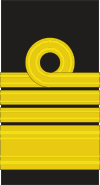Admiral (Australia)
- See Admiral for other countries which use this rank.
Admiral (ADML) is the highest active rank of the Royal Australian Navy and was created as a direct equivalent of the British Navy rank of admiral. It is a four-star rank. Since World War II, in general,[1] the only time the rank is held is when the Chief of the Defence Force is a navy officer.
Admiral is a higher rank than vice admiral, but is a lower rank than admiral of the fleet.[2] Admiral is the equivalent of air chief marshal in the Royal Australian Air Force and general in the Australian Army.
Australian admirals
The following have held the rank of admiral in the Royal Australian Navy:
| Name | Post-Nominals | Date promoted | Born | Died | Notes |
|---|---|---|---|---|---|
| Sir Hyde, GeorgeGeorge Hyde | KCB, CVO, CBE, RAN | 12 July 1936 | 1877 | 1937 | |
| Sir Smith, VictorVictor Smith | AC, KBE, CB, DSC, RAN | 23 November 1970 | 1913 | 1998 | Chairman Chiefs of Staff Committee (1970–75) |
| Sir Synnot, AnthonyAnthony Synnot | KBE, AO, RAN | 21 April 1979 | 1922 | 2001 | Chief of the Defence Force Staff (1979–82) |
| Hudson, MichaelMichael Hudson | AC, RAN | 8 March 1991 | 1933 | 2005 | Promoted to admiral on the day of his retirement by then prime minister, Bob Hawke.[1] |
| Beaumont, AlanAlan Beaumont | AC, RAN | 17 April 1993 | 1934 | 2004 | Chief of the Defence Force (1993–95) |
| Barrie, ChrisChris Barrie | AC, RAN | 4 July 1998 | 1945 | Chief of the Defence Force (1998–02) |
Rank insignia and personal flag
The current ranks are rear admiral, vice admiral, admiral and admiral of the fleet, also known as flag ranks because admirals, known as flag officers, are entitled to fly a personal flag. An admiral of the fleet flies a national flag at the masthead, while an admiral flies a St George's cross (red cross on white). Vice admirals and rear admirals fly a St George’s cross with one or two red discs in the hoist, respectively. These command flags are exactly the same as in the Royal Navy, except for the admiral of the fleet, who flies the Union Flag.
The rank of admiral itself is shown in its sleeve lace by a broad band with three narrower bands. Since the mid-1990s, the insignia of a Royal Australian Navy admiral is the crown of St. Edward above a crossed sword and baton, above four silver stars, above the word AUSTRALIA. Note that unlike other Commonwealth countries, the sword has a closed handle(that is, it is a naval cutlass). The stars have eight points, like the Royal Navy insignia (and unlike the four pointed Order of the Bath stars used by the army.)
Prior to 1995, the RAN shoulder board was identical to the UK shoulder board. (The UK shoulder board changed in 2001.)



See also
References and notes
- 1 2 Admiral Hudson was an exception to the "rule" that the only time the rank is held is when the Chief of the Defence Force is a navy officer. Although he served as Chief of Naval Staff for six years from 1985 to 1991 (the usual term is 3 years), he never held the post of CDF. He was promoted to admiral on the day of his retirement by then Prime Minister Bob Hawke.
- ↑ Note that, other than Royalty, there have been no Australian admirals of the fleet.
| Commissioned officer ranks of the Australian Defence Force | |||||||||||||
|---|---|---|---|---|---|---|---|---|---|---|---|---|---|
| Australia-United States Rank Code | Officer Cadet | O-1 | O-2 | O-3 | O-4 | O-5 | O-6 | O-7 * |
O-8 ** |
O-9 *** |
O-10 **** |
O-11 ***** | |
| Royal Australian Navy | MIDN | ASLT | SBLT | LEUT | LCDR | CMDR | CAPT | CDRE | RADM | VADM | ADML | AF | |
| Australian Army | OCDT | 2LT | LT | CAPT | MAJ | LTCOL | COL | BRIG | MAJGEN | LTGEN | GEN | FM | |
| Royal Australian Air Force | OFFCDT | PLTOFF | FLGOFF | FLTLT | SQNLDR | WGCDR | GPCAPT | AIRCDRE | AVM | AIRSMHL | ACM | MRAAF | |